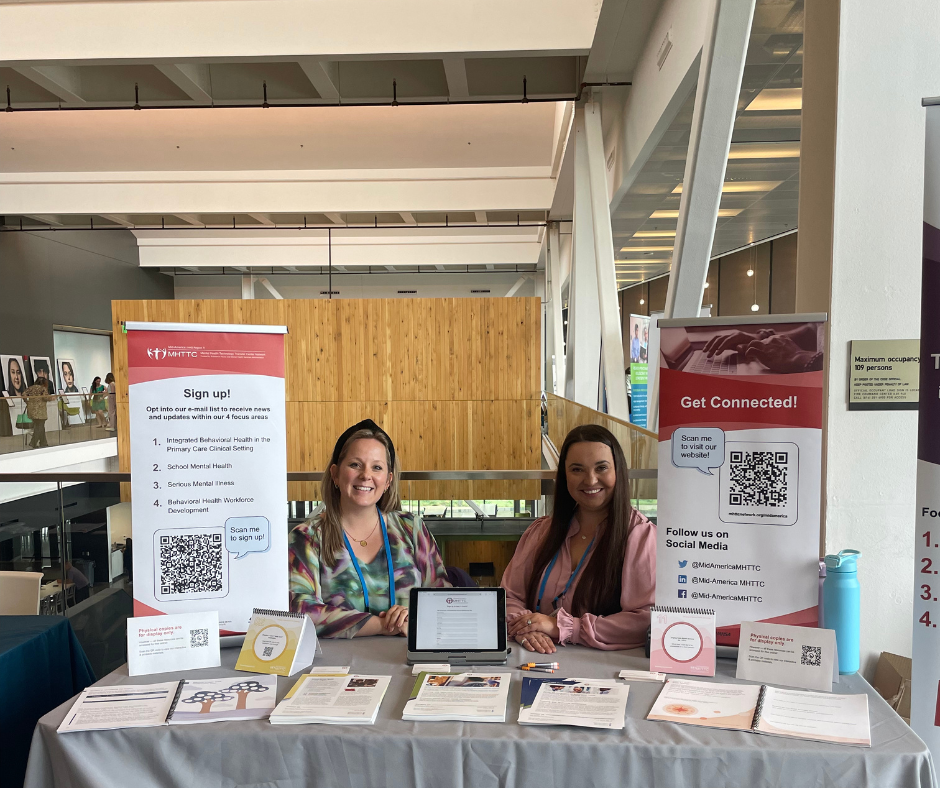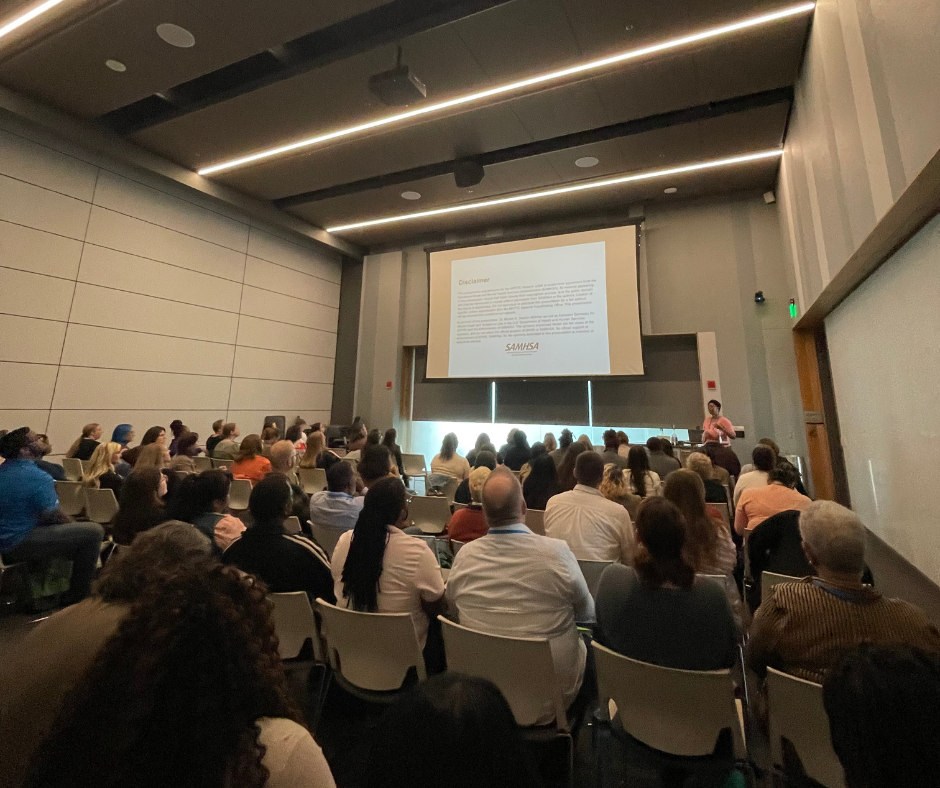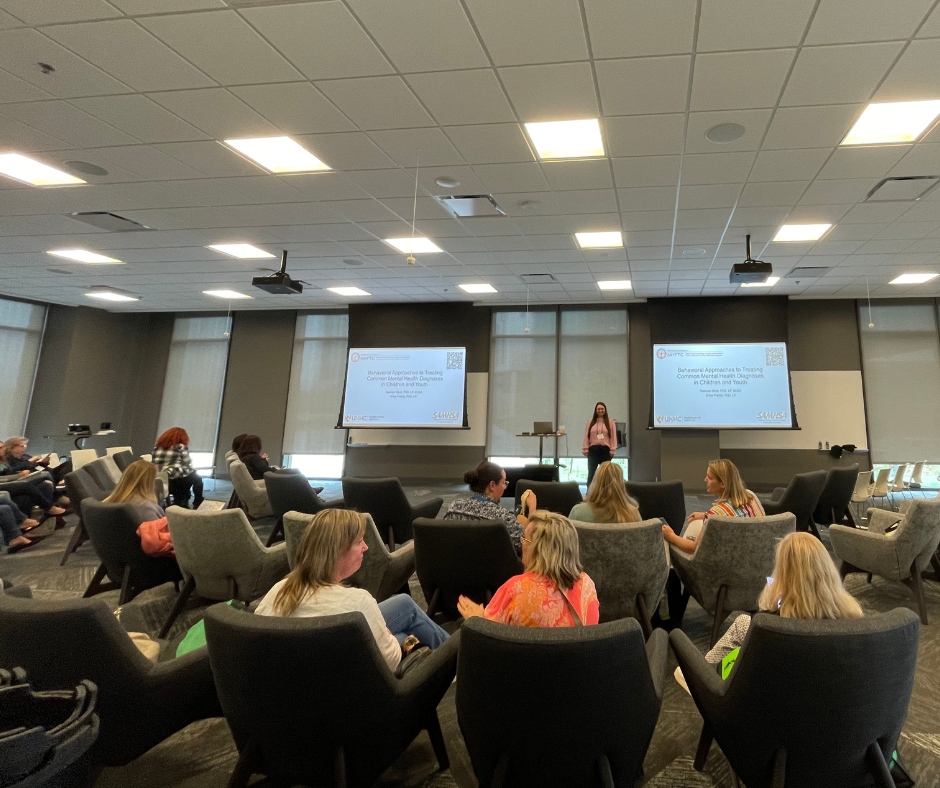The Mid-America MHTTC was a proud gold sponsor at Mental Health KC's annual conference. The conference, held May 11 & 12 at the Oracle Cerner Innovation Campus, was packed with mental and behavioral health providers and organizations from across the Kansas and Missouri area.
Aside from maintaining a booth space and connecting with attendees, our team also provided valuable evidence-based information in three presentation sessions. Read the brief description of each session below:
- Bust Through Burnout! Using the Adult Resilience Curriculum to Support Adult Well-Being | Presented by School Mental Health Program Director Erika Franta, PhD, LP and Hannah West, PhD, BCBA, LP
- "Are you tired? Do you wonder where your joy for your career went? Have you considered leaving the helping field? This workshop will introduce you to strategies that support your well-being and help to prevent long-term burnout. Professionals will learn about the Adult Resilience Curriculum (ARC), a free modular program that builds upon several empirically-supported practices to promote professional well-being. Additionally, attendees will learn strategies for implementing the ARC as a trainer within their organization/system. Facilitators will present a variety of strategies aimed at enhancing resilience and wellbeing within the workplace and discuss how strategies can be used to create a culture of well-being. Participants will begin to identify and practice strategies that align with their personal and professional values, resulting in a “personal recipe for resilience.” Participants will have access to the ARC modules, scripts, trainer manual, and workbook. Additionally, opportunities for continued technical assistance from the Mid-America MHTTC will be reviewed."
- Understanding Social Determinants of Health through a Trauma Lens | Presented by Serious Mental Illness Program Director Marla Smith, MS, LMHP, LMHC and Angela Schindler-Berg, MS, LMHP
- "Many are aware of the five sectors of the Social Determinants of Health that effect our health and quality of life-economic stability, educational access and quality, health care access and quality, neighborhood and built environment, and social and community context. These determinants can impact, or be impacted, by the experience of trauma. For health and human service organizations to give well-rounded care to the individuals they serve, they must understand how one impacts the other. Trauma itself is a social determinant of health as there are many studies that show the correlation between the development of physical and mental health ailments and experiencing traumatic events. The Social determinants of Mental Health include subcategories such as racism, sexual orientation & gender identity, and mental health stigma which impacts the healthcare that we receive as well as public opinion regarding these issues. With the implementation of 988 crisis services, it is imperative that health and human service organizations respond in a trauma informed manner and not reinforce mental health stigma with these special populations. Overall, this effort involves implementing whole person and population health strategies that consider the social determinants of health of clients and communities and organizational practices that prevent, identify, and support compassion fatigue among clinical providers and staff as they work to enhance equitable care for all."
- Behavioral Approaches to Treating Common Mental Health Diagnoses in Children and Youth | Presented by Regional Trainer Hannah West, PhD, BCBA, LP
- "There is little question that children and youth are struggling in today’s society. Anxiety is diagnosed in 9.4% of youth (Bitsko et al., 2022), and there has been a significant increase in reported symptoms since 2020 (Magson et al., 2021). Further, a recent survey of nationally represented high school students found that 37% of youth report experiencing poor mental health and 44% reported persistent feelings of hopelessness or sadness (Jones et al., 2022). Additionally, drug overdose deaths among teens have risen at a national level (Friedman et al., 2022), and teens are representing a larger share of suicides compared to pre-pandemic years (Charpignon et al., 2022). The most commonly diagnosed disorders in childhood are ADHD, anxiety, behavior disorders, and depression. This presentation will look at strategies to address these concerns that are grounded in behavioral science, providing suggestions for practice and opportunities to share with others. Key intervention strategies of teaching, practicing, and reinforcing appropriate behaviors will be introduced. Additionally, extinction procedures and appropriate consequence strategies will be discussed. These basic behavior management skills will then be utilized as participants discuss specific intervention strategies (e.g., differential reinforcement procedures, noncontingent reinforcement, behavioral contracts, self-monitoring, behavioral activation, etc.) and practice with various case study examples."



Questions? Email us at [email protected]


